Power Analysis: Which grand tour was hardest in 2022?
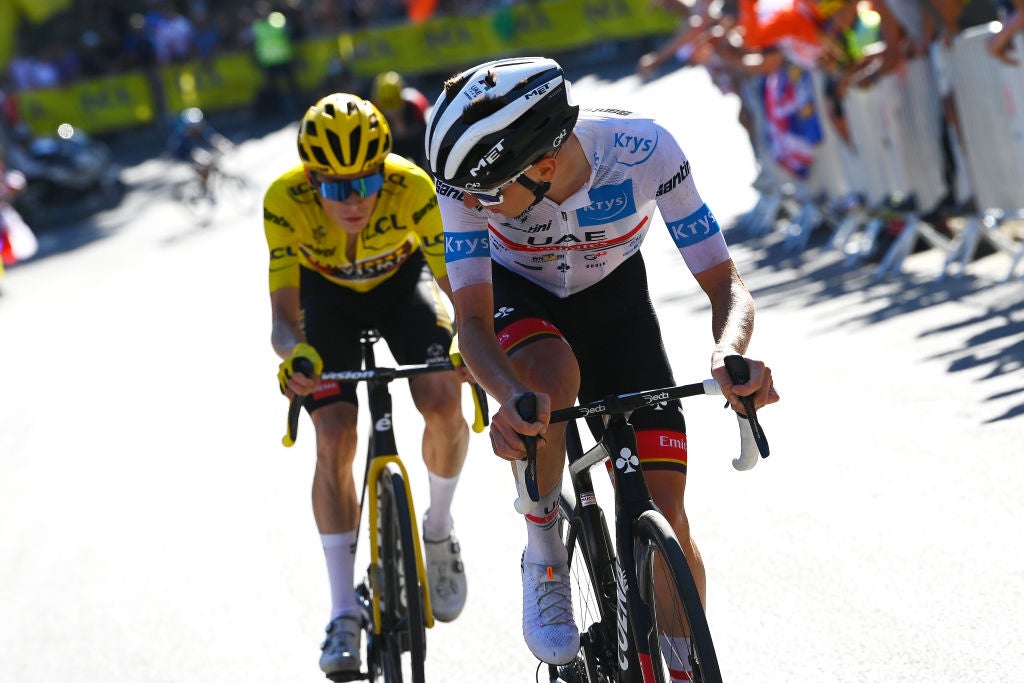
Vingegaard will race through the Dauphiné to finesse his TdF form. (Photo: Getty Images)
The 2022 season has come and gone in the blink of an eye.
It can be hard to believe that 2022 was the year that Tadej Pogačar soloed 49km to win Strade Bianche, Matej Mohorič used a dropper post and daredevil descending skills to win Milano-Sanremo, Dylan van Baarle upset the favorites at Paris-Roubaix, and Remco Evenepoel provided a preview of his world championship win by soloing to victory at Liège-Bastogne-Liège.
But in this article, we’re looking at cycling’s three grand tours: the Giro d’Italia, Tour de France, and Vuelta a España. Everyone says that the Tour is the hardest; but is that truly the case? It is rare to see the same riders competing across the three grand tours. Plus, you have to add in varying weather, fatigue, and peak racing conditions.
What we’ll find is that, when it comes to peak climbing performances, the Giro, Tour, and Vuelta have more in common than you might think. From the cool Italian spring to the hot French pavement in July, and the ultra-steep Spanish climbs, these are the three grand tours of cycling.
- Power Analysis: Vingegaard destroys Pogačar in the Pyrenees at the Tour de France
- Power Analysis: How Jai Hindley won the Giro d’Italia
First on the grand tour calendar is the Giro d’Italia, won this year by Jai Hindley. The best climbing performances from the Giro came on stages 16 and 20. First was the trident of performers on Santa Cristina, the final climb of Stage 16 to Aprica. Mikel Landa had one of the best climbs of his career, staying alongside Richard Carapaz and Hindley for over 36 minutes.
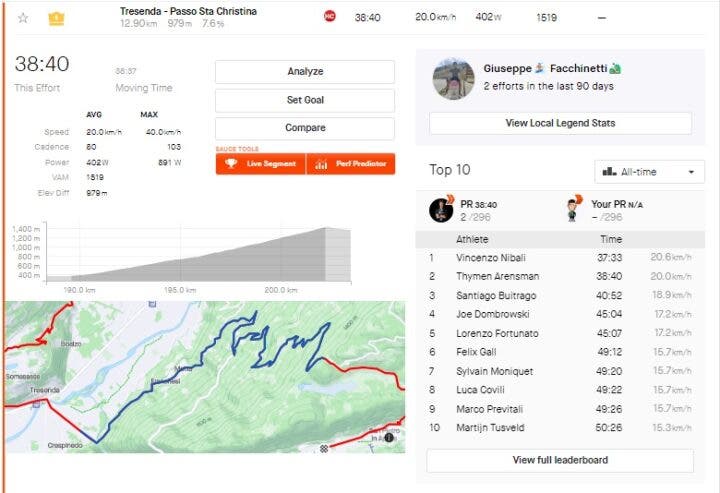
Hindley, Carapaz, and Landa – Santa Cristina on stage 16 of the Giro
- Time: 36:15
- Estimated Average Power: ~6.2w/kg
But the Giro wasn’t over yet, and there was one final mountain stage that finished at the Passo Fedaia. Richard Carapaz still held the maglia rosa, but Hindley was within striking distance with one major climb to go.
The Australian produced one of the best performances of his career, doing ~6w/kg for 37 minutes and dropping Carapaz with 5.5km to go. Carapaz cracked big time, and Hindley went on to win the Giro thanks to this wonderful climbing performance.
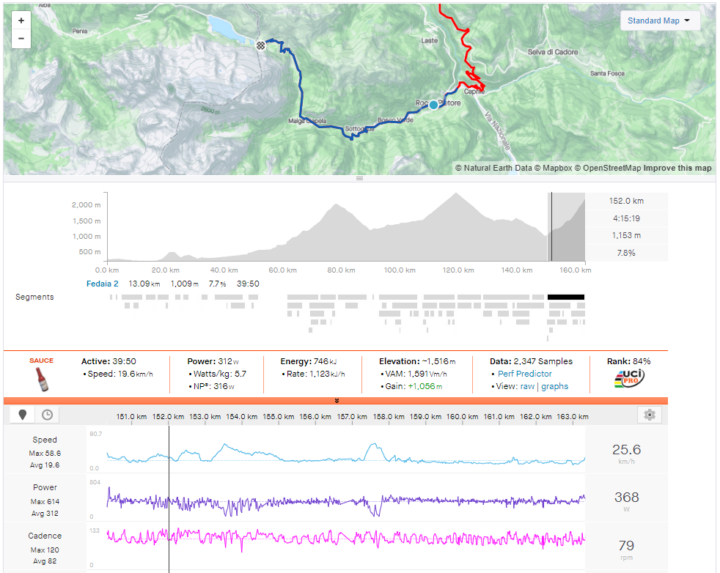
Hindley – Passo Fedaia on stage 20 of the Giro
- Time: 37:47
- Estimated Average Power: ~6w/kg
- Final 5.5km: ~6.5w/kg for 19:54
A few months later, the biggest race in cycling took center stage in Copenhagen, Denmark. The Tour de France began as expected, with Jumbo-Visma and Tadej Pogačar dominating nearly half of the opening stages. However, things started to change at the first summit finish on La Super Planche des Belles Filles. Though Pogačar won the stage, many were surprised that it was Jonas Vingegaard taking the reins and attacking with 500 meters to go.
On the first major mountain stage of the Tour, Vingegaard and Pogačar nearly matched Hindley’s best performance of the Giro with 6.5w/kg for 20 minutes.
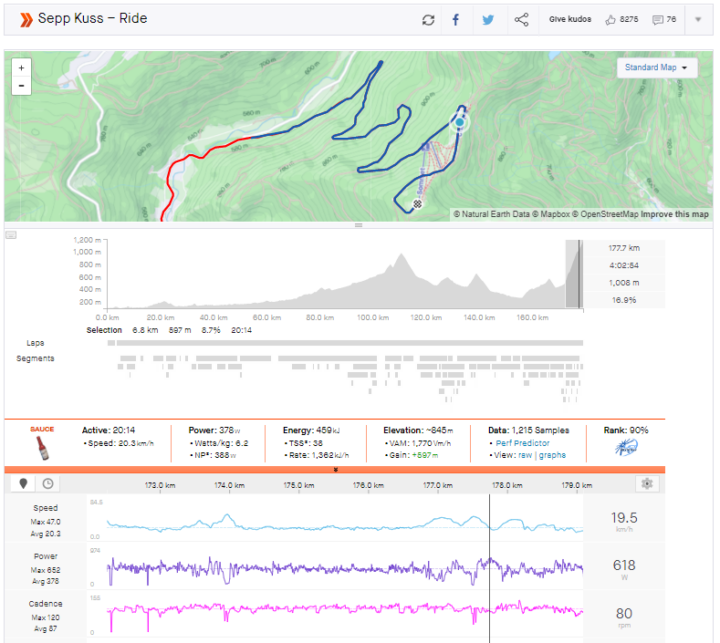
Pogačar and Vingegaard – La Super Planche des Belles Filles on stage 8 of the Tour
- Time: 19:33
- Estimated Power: ~6.5w/kg
The official changing of the guard came on Stage 11 of the Tour atop Col du Granon. Vingegaard did 6.1/kg for 36 minutes and put nearly three minutes into Pogačar. This was the stage the Primož Roglič and Vingegaard attacked Pogačar relentlessly, building up an amount of fatigue that proved insurmountable by the time Pogačar reached the final climb.
It was the very next day that Vingegaard and Pogačar backed up their climbing performance with 6.1/kg for 39 minutes on Alpe d’Huez. With only a few mountain stages to go, would we see an even bigger climbing performance?
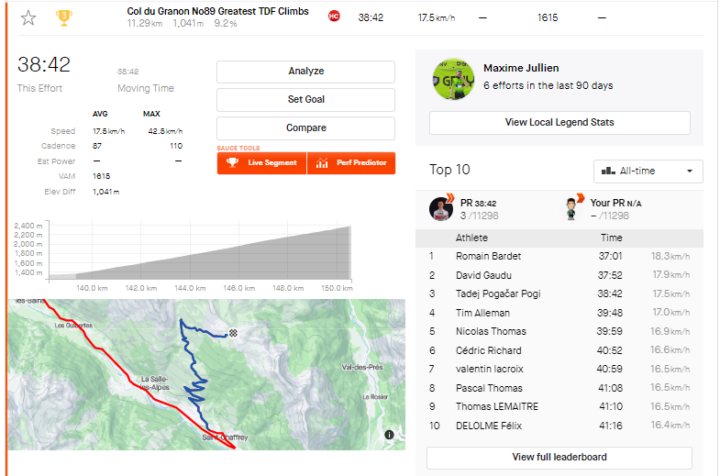
Pogačar and Vingegaard – Col du Granon on stage 11 of the Tour
- Vingegaard: ~6.1w/kg for 35:51
- Pogačar: ~5.6w/kg for 38:42
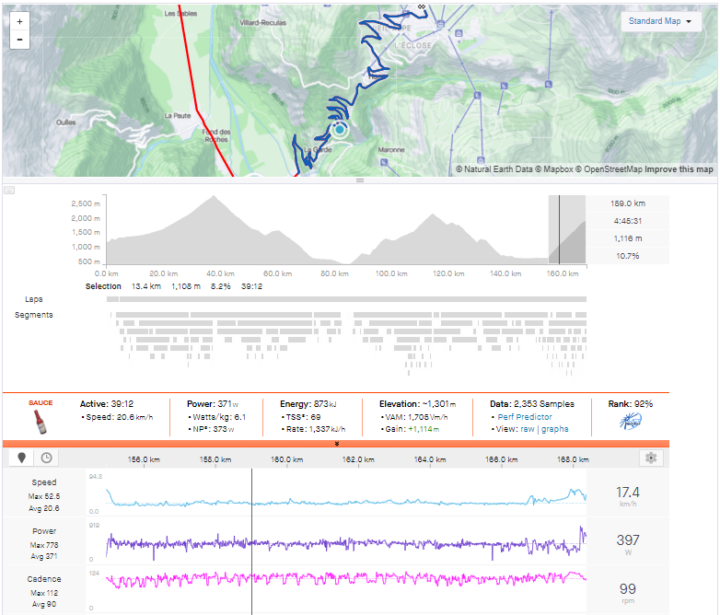
Pogačar and Vingegaard – Alpe d’Huez on stage 12 of the Tour
- Time: 39:09
- Estimated Power: ~6.1w/kg
Indeed, there would be an even better climbing performance in the third week of the Tour. This time, it came on the infamous Hautacam, where Vingegaard put the nail in Pogačar’s coffin. On stage 18 of the Tour, with nearly three weeks of accumulated fatigue, Vingegaard dropped Pogačar off the wheel with 6.2w/kg for 36 minutes.
Even more impressive was the fact that the penultimate climb on stage 18 was ridden at 6.1w/kg for 30 minutes, including 6.5w/kg for the first 13 minutes. Sound familiar?
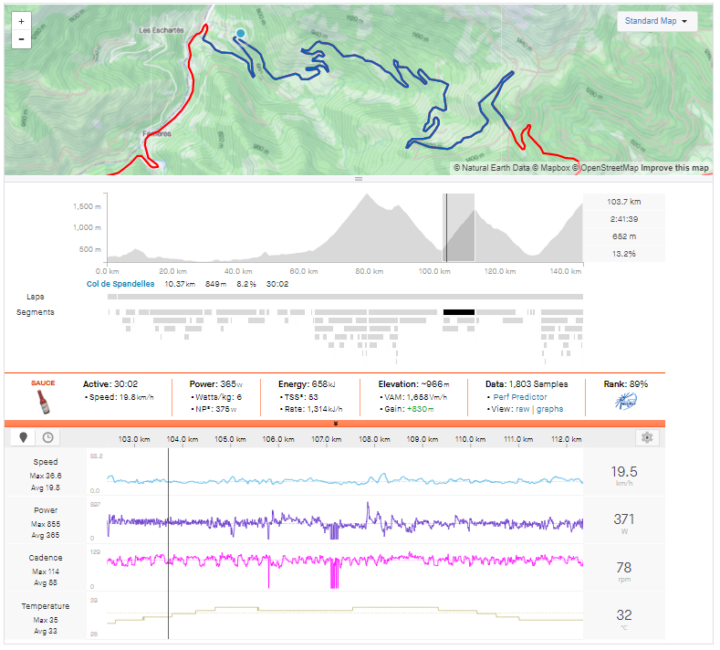
Vingegaard – (Penultimate climb) Col du Spandelles on Stage 18 of the Tour
- Time: 30:02
- Estimated Power: ~6.1w/kg
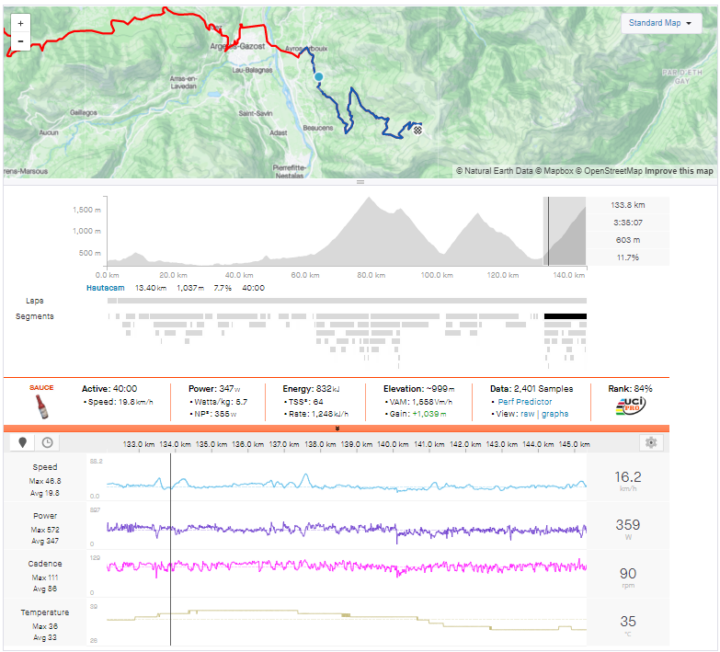
Vingegaard – Hautacam on Stage 18 of the Tour
- Time: 36:33
- Estimated Power: ~6.2w/kg
- Final 5.5km: ~6.6w/kg for 11:51
Vingegaard went on to win the Tour de France, taking a grand tour title for the first time in his career. And it wasn’t long before we saw another rider vying for their first grand tour win: Remco Evenepoel.
This year’s Vuelta a España was extremely front-loaded, meaning we saw all the best climbing performances in the first half of the tour. We have to take this into consideration when comparing the Vuelta to the Giro and the Tour, given the relative freshness of riders in the first 10 days of a grand tour.
With that said, we’ll jump right into one of the best climbing performances of the season, and it wasn’t done by a grand tour winner. On Stage 6 of the Vuelta, Jay Vine did 6.2w/kg for 28 minutes and won the summit finish from the peloton. That means dropping Evenepoel, Enric Mas, Roglič, and everyone else in the professional peloton.
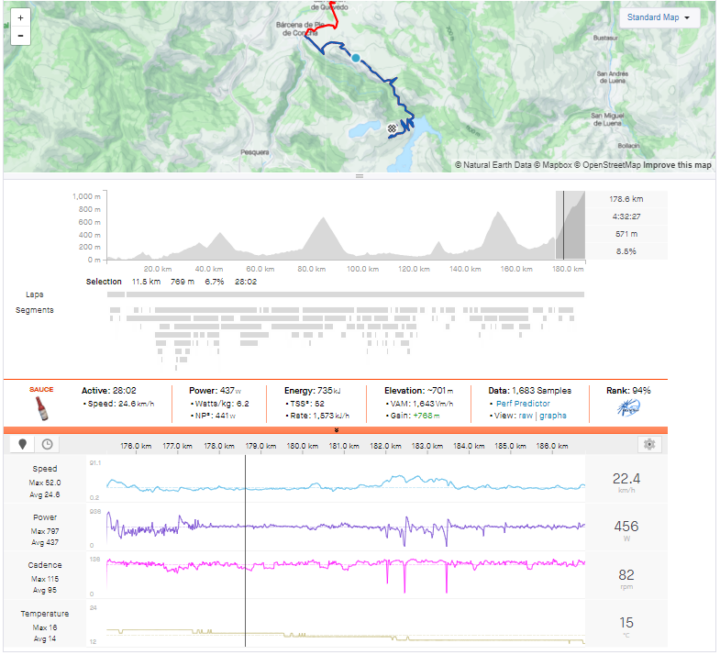
Vine – Pico Jano on stage 6 of the Vuelta
- Time: 28:02
- Average Power: 6.2w/kg
- Peak 13min Power: 6.6w/kg
As we’re piecing this together, it’s funny how many 13-minute attacks there have been in grand tours. Cyclists like to focus on their 5-minute power and 20-minute power, but maybe we should be focusing on our 13-minute power instead.
Vine didn’t have to wait long before taking his second-ever grand tour stage victory on Stage 8 of the Vuelta. Evenepoel put it another great performance on the final climb, the Colláu Fancuaya. The Belgian did a big negative split on the climb, meaning that he went much faster in the second half. This suggests that Evenepoel could’ve done a higher average power for the entirety of the climb had he ridden flat out the entire time.
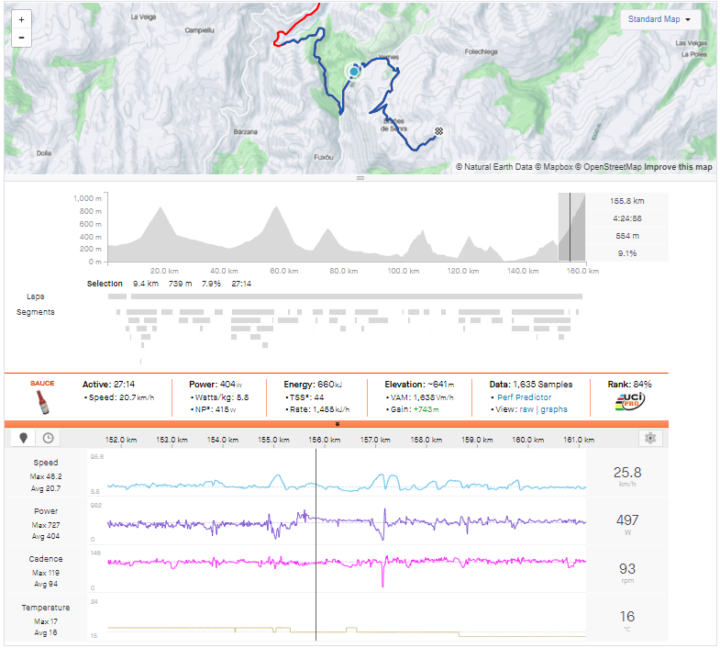
Evenepoel – Colláu Fancuaya on stage 8 of the Vuelta
- Time: 27:29
- Estimated Average Power: ~6.4w/kg
- Final 4.2km: ~6.9w/kg for 11 minutes
The rest of the Vuelta only contained one other incredible climbing performance to Peñas Blancas. It was Stage 12, and Richard Carapaz won from the breakaway on one of the longest climbs in the race. Evenepoel finished 15th on the day but was first out of the peloton after pushing 6.1w/kg for 45 minutes.
The biggest difference between Evenepoel’s performance on stage 12 and the best grand tour climbs of 2022 is that there wasn’t a big 6.5+w/kg attack in the final 5km.
Evenepoel – Peñas Blancas on stage 12 of the Vuelta
- Time: 45:32
- Estimated Average Power: ~6.1w/kg
Now we have all the numbers, but is there anything we can learn? Well, there is no doubt that the Tour de France is the hardest grand tour overall. The sprint stages are fast and crazy, the medium mountain stages are quick and chaotic, and the high mountain stages border on leg-shattering.
By contrast, the Giro contained numerous sprint stages where the peloton went at a coffee ride pace until the last 15km. The Vuelta had a few easy transition stages, but it was also front-loaded with climbs so there wasn’t as much fatigue accumulated before high mountain performances.
But when it comes to peak climbing performances, the answer isn’t so clear. All three grand tours included massive efforts by one or more riders – we’re talking about 6+w/kg for 30-40 minutes with 6.5-7w/kg attacks for 10-15 minutes. These are the best one-climb performances from each grand tour.
- Giro: 6.2/kg for 36 minutes – Hindley, Carapaz, and Landa on stage 16 of the Giro
- Tour: 6.2w/kg for 36 minutes – Vingegaard on stage 18 of the Tour
- Vuelta (shorter): 6.4w/kg for 27 minutes – Evenepoel on stage 8 of the Vuelta
- Vuelta (longer): 6.1w/kg for 45 minutes – Evenepoel on stage 12 of the Vuelta
When you take every stage into consideration, the Tour de France is the hardest grand tour. There were simply more incredible climbing performances across three weeks of racing. While Hindley and Evenepoel can achieve big numbers, Vingegaard can do it day after day, week after week. Sometimes, Vingegaard was doing 6.1w/kg for 30 minutes twice in a single stage.
Looking at Hindley’s Giro-winning climb and Vingegaard’s performance on Hautacam, it is clear that Vingegaard is the better climber in the world at his peak. Both riders attacked at 5.5km to go on the final major climb of a Grand Tour which just so happened to be 36 minutes long – that’s not a typo. Both riders showed excellent 20-minute power followed by an even better 12-20 minute power.
Hindley on Stage 20 of the Giro: 6w/kg for 37 minutes including the last 20 minutes at 6.5w/kg
Vingegaard on Stage 18 of the Tour: 6.2w/kg for 36 minutes including the last 12 minutes at 6.6w/kg
The biggest question remaining is “Can Evenepoel climb with Vingegaard and Pogačar?” Based on the Belgian’s peak numbers, he certainly can. The difficulty will be stringing together these performances, and backing them up with a 30-minute, 6.2w/kg performance in the final week of a Grand Tour.
***
Power Analysis data courtesy of Strava
Strava sauce extension
Riders:
- Jai Hindley
- Jonas Vingegaard
- Tadej Pogačar
- Jay Vine
- Remco Evenepoel